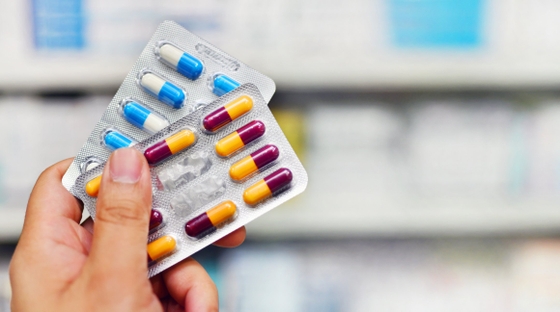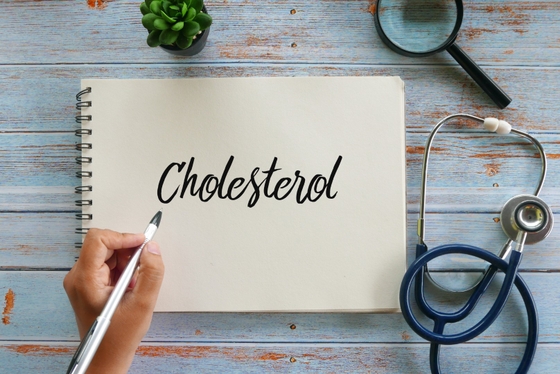
Blood cholesterol
Keeping your blood cholesterol at a healthy level can help you reduce your risk of heart disease and other serious conditions.
Key takeaways
5 min read
Cholesterol is essential for the normal functioning of the body
The body produces cholesterol naturally, but it’s also in some foods
High cholesterol can increase your risk of heart disease
Living a healthy lifestyle can help lower your cholesterol levels.
What is blood cholesterol?
Cholesterol is a waxy, fat-like substance necessary to make hormones and vitamin D, and to help you digest food. Your body produces cholesterol, and it’s also in some foods.
The human body uses cholesterol to build cells, but too much can put you at risk of heart disease.
This video explains what cholesterol is, how it affects your heart, and what you can do to manage your levels for better heart health.
Types of cholesterol
The two most common types of cholesterol are:
Low-density lipoprotein (LDL) – the ‘bad’ cholesterol
Low-density lipoprotein makes up most cholesterol and is bad because it can stick to the walls of arteries and cause a fatty build-up called plaque. Too much plaque leads to blockages that prevent blood from flowing properly to the heart.
High-density lipoprotein - the 'good' cholesterol
High-density lipoprotein is healthy because it carries LDL away from the arteries and back to the liver to be broken down and then passed as waste.
Cholesterol and triglycerides
Triglycerides are the most common fat in the body. Being overweight, eating a lot of high fat and sugary foods, or drinking too much alcohol can increase your triglyceride levels. High triglycerides, along with either increased LDL cholesterol or decreased HDL cholesterol can increase your chances of developing fatty build-ups in the arteries – and a higher risk of heart attack and stroke.
Signs and symptoms of high cholesterol
High cholesterol generally doesn’t have obvious symptoms, but it can increase the risk of serious health conditions if left untreated. That’s why it’s important to get a blood test and regular check-ups.
If you are 45 or older (30 or older, if you are Aboriginal or Torres Strait Islander), see your doctor for a cholesterol test as part of a Heart Health Check. If you have a family history of high cholesterol, speak to your GP about your heart disease risk.
Why is high cholesterol bad for you?
If you have high cholesterol, you can develop fatty deposits in your blood vessels. This makes it difficult for blood to flow through the arteries. If these deposits break apart, they can form a clot that leads to a heart attack or stroke.
Total cholesterol is a measure that includes good and bad cholesterol. It’s not always the best measure of your risk of heart disease on its own. The best way to understand these levels and your risk for heart disease is to see your GP for a Heart Health Check.
What causes high cholesterol?
There is no single cause of high cholesterol, but there are some controllable risk factors (e.g. smoking) and non-controllable risk factors (e.g. age).
Risk factors for high cholesterol include:
- Age
- Smoking
- Lack of physical activity
- Overweight or obesity
- Family history
- Unhealthy diet.
No matter what the cause, improving your lifestyle, including your diet, can help reduce your risk of heart disease.
How is cholesterol measured?
Cholesterol is measured with a blood test called a lipid panel or lipid profile. A cholesterol test usually involves having your blood drawn from a vein in your arm. The test can help determine your risk of atherosclerosis, which is a build-up of plaque that narrows or blocks arteries.
How to interpret your cholesterol results
Guidelines for target cholesterol levels vary based on factors such as age and family history, so ask your doctor what levels are right for you.
A full blood-cholesterol test usually checks:
- Total cholesterol
- LDL cholesterol
- HDL cholesterol
- Triglycerides
- Non-HDL cholesterol.
How can you lower high cholesterol?
There are
Diet
Some foods are higher in cholesterol than others, or they may contain ingredients that can contribute to high cholesterol.
Following a heart healthy eating pattern over time can help lower your cholesterol, including:
- Plenty of vegetables, fruits and wholegrains
- A variety of healthy protein sources, especially fish and seafood, legumes (such as beans and lentils), nuts and seeds. Smaller amounts of eggs and lean poultry can also be included in a heart healthy diet. If choosing red meat, make sure the meat is lean and limit to 1-3 times a week
- Unflavoured milk, yoghurt and cheese. Those with high blood cholesterol should choose reduced fat options
- Healthy fat choices with nuts, seeds, avocados, olives and their oils for cooking
- Herbs and spices to flavour foods, instead of adding salt.
Eating foods that contain plant sterols can also help lower high cholesterol. Plant sterols are cholesterol-like substances that occur naturally in fruits, vegetables, nuts and cereals in small amounts.
Physical activity
Physical activity can help raise HDL or ‘good’ cholesterol levels and lower triglycerides. Aerobic or cardio exercise and resistance training are particularly helpful for controlling cholesterol levels.
Start with small, realistic goals and work your way up to the recommended 30-60 minutes of moderate-intensity physical activity (e.g. brisk walking) most days of the week.
Aim to do muscle-strengthening activities twice a week, including bodyweight exercises like push-ups, squats or tasks involving lifting, such as carrying shopping.
Medication
Your GP may recommend medication to help lower your cholesterol and to reduce your risk of heart attack or stroke.
Follow your doctor’s advice and take your medicine exactly as directed. Don’t stop because you feel better. It will continue to work in the background to keep your cholesterol under control.
The most common type of cholesterol-lowering medications is part of a group known as statins. Statins are medicines that lower the level of LDL or ‘bad’ cholesterol in your blood. Statins also help reduce the chance of heart attack or stroke for those at high risk.
References
- Grundy SM, Stone NJ, Bailey AL, et al. 2018 AHA/ACC/AACVPR/AAPA/ABC/ACPM/ADA/AGS/APhA/ASPC/NLA/PCNA Guideline on the Management of Blood Cholesterol: A Report of the American College of Cardiology/American Heart Association Task Force on Clinical Practice Guidelines. Circulation. 2019;139(25):e1082-e1143. doi:doi:10.1161/CIR.0000000000000625
- National Heart Foundation of Australia. Phytosterol/stanol Enriched foods & Heart Healthy Foods. A dietary position statement from the National Heart Foundation of Australia, Melbourne: National Heart Foundation of Australia; 2017
- Ma H, Shieh K-J. Cholesterol and human health. The Journal of American Science. 2006;2(1):46-50.
You might also be interested in...

Heart medicines – Frequently asked questions
Find answers below to frequently asked questions about heart medicines.

Five ways to lower cholesterol
Did you know cholesterol in food only plays a small part in increasing our bodies’ cholesterol levels? But what we eat has a big role to play in managing our cholesterol and heart health.

Let’s chew the fat about cholesterol: your top five questions answered
You might’ve heard there is ‘good’ cholesterol and ‘bad’ cholesterol. Our bodies need some cholesterol to help build cells, hormones and vitamin D. But high levels of the bad kind can clog arteries and increase the risk of a heart attack or stroke.
Last updated09 April 2025
Last reviewed19 November 2024